Mastering ChatGPT Prompts for SEO: A Comprehensive Guide
Harnessing the Full Potential of ChatGPT Prompts for writing SEO Content
Prompts are a powerful tool in the world of AI, and ChatGPT is no exception. It’s more than just a text generator; it’s a conversational AI that can provide information, generate creative content, and assist with various tasks. In this article, we’ll explore how to harness the full potential of ChatGPT prompts.
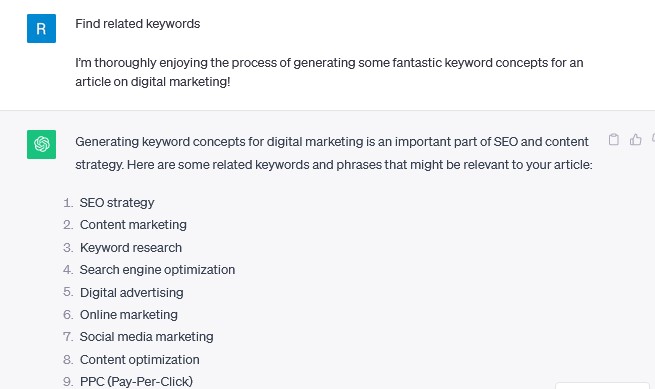
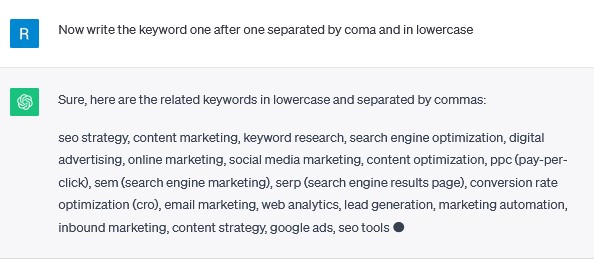
1. Find related keywords
I’m thoroughly enjoying the process of generating some fantastic keyword concepts!
Prompt:
“Identify 10 SEO keywords related to [topic].”
2. Find keywords related to product descriptions
It’s often a good practice to examine an existing product description.
Prompt:
“Create a list of 5 SEO keywords related to the following product description [product description].”
3. Identify popular questions
Questions serve as a pathway to understanding the inner workings of the human mind!
Prompt:
“Suggest a list of 5 popular questions related to [Keyword].”
4. Research keyword strategies
AI is on the verge of becoming an SEO grandmaster, consistently staying a step ahead of junior SEO practitioners.
Prompt:
“Research the top 5 SEO keyword strategies for [topic].”
5. Classify search intents
Tables prove useful for structuring your search data.
Prompt:
“Classify the search intent (commercial, transactional or informational) for the following keywords in a table:…”
6. Cluster, a list of keywords
This brilliant idea was sparked by a Twitter source!
Prompt:
“Cluster the following keywords (add a core topic for each group) based on their semantic relevance:…”
7. Suggest blog post titles related to keywords
Writer’s block? How about calling it “writer’s rock,” am I right?
Prompt:
“Suggest compelling blog post titles related to the following list of SEO keywords:…”
8. Create targeted blog post titles
Let the AI know your target audience.
Prompt:
“Suggest 5 blog post title ideas for the keyword [keyword] targeted [audience].”
9. Write catchy blog post titles
Dull titles are a guaranteed method to drive readers away.
Prompt:
“Make the blog post titled [title] more catchy.”
10. Get better click-through rates
We certainly desire those clicks, don’t we?
Prompt:
“Write 3 examples of alternative blog post titles with higher CTR for [topic].”
Keyword Generation and Blog Title Suggestions Using ChatGPT
In the realm of digital marketing and search engine optimization, the process of keyword generation and blog title suggestions stands as a fundamental and strategic endeavour. This section delves into the art of harnessing ChatGPT’s capabilities to identify, create, and optimize SEO keywords and blog post titles. By exploring the intricacies of keyword research, professionals can uncover the most relevant and trending terms, thus enhancing their content’s visibility in search engine results. Simultaneously, we’ll uncover how ChatGPT’s creative potential can be harnessed to suggest compelling and captivating blog post titles, captivating the attention of readers and driving higher click-through rates. This section offers valuable insights into leveraging the power of AI-driven content creation for the advancement of SEO practices.
Clustering and Classifying Search Intent with AI:
Once you have completed the content and now need all on page features to be filled up, here are the prompts that will generate that for you. Just copy from the next line until the 11th point after pasting the content in ChatGPT, and it will automatically generate all your required on page items as mentioned below.
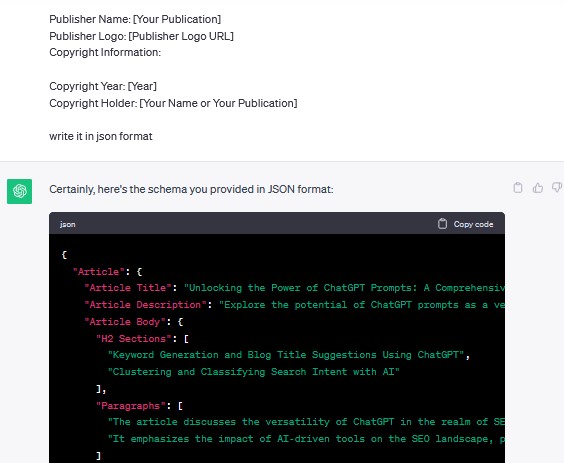
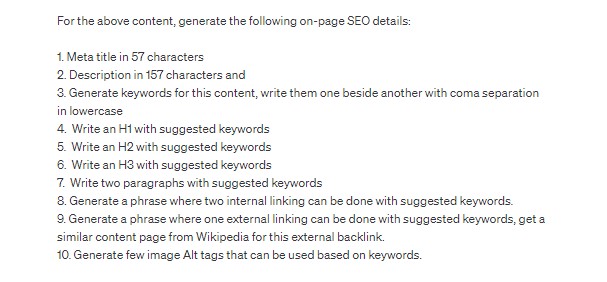
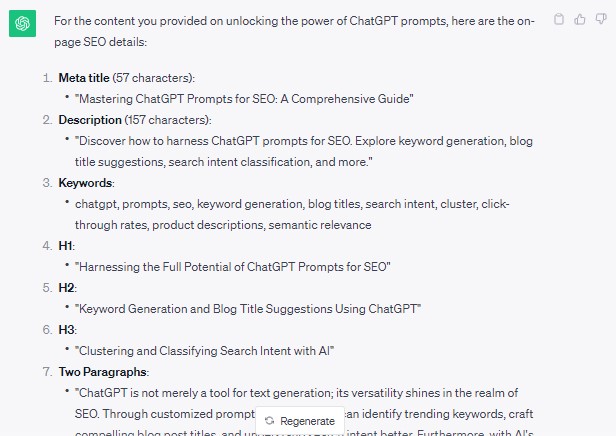
Prompt:
“Based on the above content, generate the following.”
1. Meta title in 57 characters
2. Description in 157 characters and
3. Generate keywords for this content, write them one beside another with coma separation in lowercase
4. Write an H1 with suggested keywords
5. Write an H2 with suggested keywords
6. Write an H3 with suggested keywords
7. Write two paragraphs with suggested keywords
8. Generate a phrase where two internal linking can be done with suggested keywords.
9. Generate a phrase where one external linking can be done with suggested keywords, get a similar content page from Wikipedia for this external backlink.
10. Generate few image Alt tags that can be used based on keywords.
11. Generate service, product, person, organization or other related schema as deemed fit for the given content with the following features:
- Service Schema:
- Service Name: The name of the service.
- Service Description: A brief description of the service.
- Service Type: The type or category of service (e.g., cleaning service, consulting service).
- Service Provider: The person or organization providing the service.
- Service Location: The physical or virtual location where the service is offered.
- Service Price: The price or cost associated with the service.
- Service Rating: User reviews and ratings for the service.
- Service Availability: The hours and days when the service is available.
- Service Contact Information: Contact details for inquiries or bookings.
- Product Schema:
- Product Name: The name of the product.
- Product Description: A detailed description of the product.
- Product Brand: The brand or manufacturer of the product.
- Product Category: The category or type of product (e.g., electronics, clothing).
- Product Price: The price of the product.
- Product Availability: The stock status and availability of the product.
- Product Rating: User reviews and ratings for the product.
- Product Image: Images of the product.
- Product SKU (Stock Keeping Unit): A unique identifier for the product.
- Person Schema:
- Name: The full name of the person.
- Date of Birth: The birthdate of the person.
- Gender: The gender of the person.
- Address: The current or primary address of the person.
- Contact Information: Email, phone number, or other contact details.
- Occupation: The person’s occupation or job title.
- Social Media Profiles: Links to the person’s social media profiles.
- Education: Educational qualifications and institutions.
- Biography: A brief biography or summary of the person’s life.
- Organization Schema:
- Organization Name: The name of the organization.
- Organization Type: The type of organization (e.g., corporation, non-profit).
- Address: The main office or location of the organization.
- Contact Information: Contact details for inquiries or customer support.
- Founding Date: The date the organization was founded.
- Description: A brief description of the organization’s mission or purpose.
- Logo: The organization’s logo.
- Key People: Names and roles of key individuals within the organization.
- Social Media Profiles: Links to the organization’s social media accounts.
ChatGPT is not merely a tool for text generation; its versatility shines in the realm of SEO. Through customized prompts, professionals can identify trending keywords, craft compelling blog post titles, and understand search intent better. Furthermore, with AI’s assistance, one can delve deep into product descriptions and improve click-through rates by tweaking content titles.
For individuals in the SEO sector, adapting and understanding the scope of AI-driven prompts can be game-changing. From clustering keywords based on semantic relevance to classifying search intent, the nuances covered by ChatGPT are extensive.
As we delve into the intricacies of SEO of on page, the importance of external content sites like Quora has increased and using Quora for brand outreach is a strategy well executed by many until now. In the ever-evolving landscape of SEO, the surge in AI-driven tools finds a parallel in the expansive growth evident on platforms like Wikipedia, known for its dynamic content, as can be read here Wikipedia page on Search engine optimization. Keep Learning from Mr Omkar Nath Nandi how to improve your website’s ranking and get a better SEO-driven visibility.
- Mastering ChatGPT Prompts for SEO: A Comprehensive Guide - October 18, 2023
- Unveiling the Secrets of Quora Success: Building Your Brand and Generating Leads - October 17, 2023


